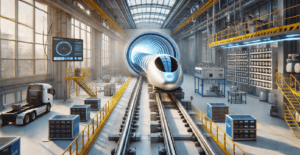India’s Hyperloop Project Advances with Electronics Development at ICF Chennai, Minister Ashwini Vaishnaw Announces
Union Minister Ashwini Vaishnaw announced on March 15, 2025, that the electronics technology for India’s Hyperloop project will be developed at the Integral Coach Factory (ICF) in Chennai. He visited the IIT Madras Hyperloop testing facility, which houses the longest test tube of its kind in Asia. Vaishnaw emphasized the use of indigenous technologies and expressed confidence that India will soon introduce Hyperloop transportation. The Ministry of Railways is supporting the project financially and technically.
Skilled experts from the Vande Bharat train project will apply their expertise to the Hyperloop system at ICF. Vaishnaw also praised India’s youth for excelling in data science, AI, and semiconductors, which are key to India’s development. He mentioned that India has five operational semiconductor facilities and is set to launch its first domestically made semiconductor by the end of the year. Vaishnaw attended the IIT Madras “Open House 2025” exhibition, where over 60 innovative projects were showcased.

India’s Hyperloop Project Advances with Electronics Development at ICF Chennai, Minister Ashwini Vaishnaw Announces
On March 15, 2025, Union Minister Ashwini Vaishnaw made an exciting announcement about India’s Hyperloop project. He revealed that the electronics technology for this futuristic transportation system, developed by IIT Madras, will be manufactured at the Integral Coach Factory (ICF) in Chennai. During his visit to the Hyperloop testing facility at IIT Madras’ Thaiyur campus, Vaishnaw highlighted that the 410-meter-long Hyperloop test tube is the longest in Asia, showcasing India’s progress in this cutting-edge technology.
Vaishnaw emphasized that the Hyperloop system has been built using homegrown technologies and has shown excellent results in testing. He expressed confidence that India is close to introducing Hyperloop transportation, which could revolutionize travel. The project is being led by TuTr Hyperloop, a deep-tech startup from IIT Madras, and aims to become the world’s first commercial Hyperloop system. This initiative aligns with India’s vision of becoming self-reliant (Atmanirbhar Bharat) and a developed nation (Viksit Bharat) by 2047.
The Ministry of Railways is supporting the project financially and technically. Vaishnaw mentioned that the same skilled experts who worked on the electronics systems for the Vande Bharat high-speed trains will now contribute to the Hyperloop project at ICF. He praised India’s youth for excelling in fields like data science, artificial intelligence, and semiconductors, stating that they will play a crucial role in the country’s development.
In addition to the Hyperloop project, Vaishnaw shared that India now has five operational semiconductor facilities. He announced that the country is set to launch its first locally made semiconductor by the end of the year, marking another milestone in India’s technological advancement.
During his visit to IIT Madras, Vaishnaw also attended the CFI Open House 2025, an exhibition showcasing 60 innovative projects created by over 1,000 students. He interacted with the students, encouraged their efforts, and presented awards to the winners of the innovation competition. Vaishnaw praised the young engineers and innovators for their contributions, stating that their work would benefit not only India but also the global tech community.
IIT Madras Director, Professor V. Kamakoti, thanked the Minister for his support and acknowledged the hard work of the students and researchers involved in the project. He expressed optimism that these innovations would have a significant impact both nationally and internationally.
The Hyperloop project represents a major step forward for India in the field of advanced transportation. By leveraging indigenous technologies and the expertise of ICF Chennai, India is positioning itself as a global leader in high-speed transportation systems. The 410-meter-long test tube at IIT Madras is a testament to the country’s growing capabilities in this area.
Vaishnaw’s visit to the IIT Madras campus also included a live demonstration of the Hyperloop system, which left a strong impression on him. He reiterated the government’s commitment to supporting new technologies and praised the role of India’s youth in driving innovation. With the largest pool of skilled young professionals in the world, India is well-equipped to achieve its goals of becoming a developed nation by 2047.
In summary, India is making remarkable progress in developing Hyperloop technology, with IIT Madras and ICF Chennai playing key roles. The project reflects the country’s commitment to innovation, self-reliance, and technological advancement. With the support of the government and the talent of India’s youth, the dream of Hyperloop transportation is becoming a reality, paving the way for a brighter and more connected future.
You must be logged in to post a comment.